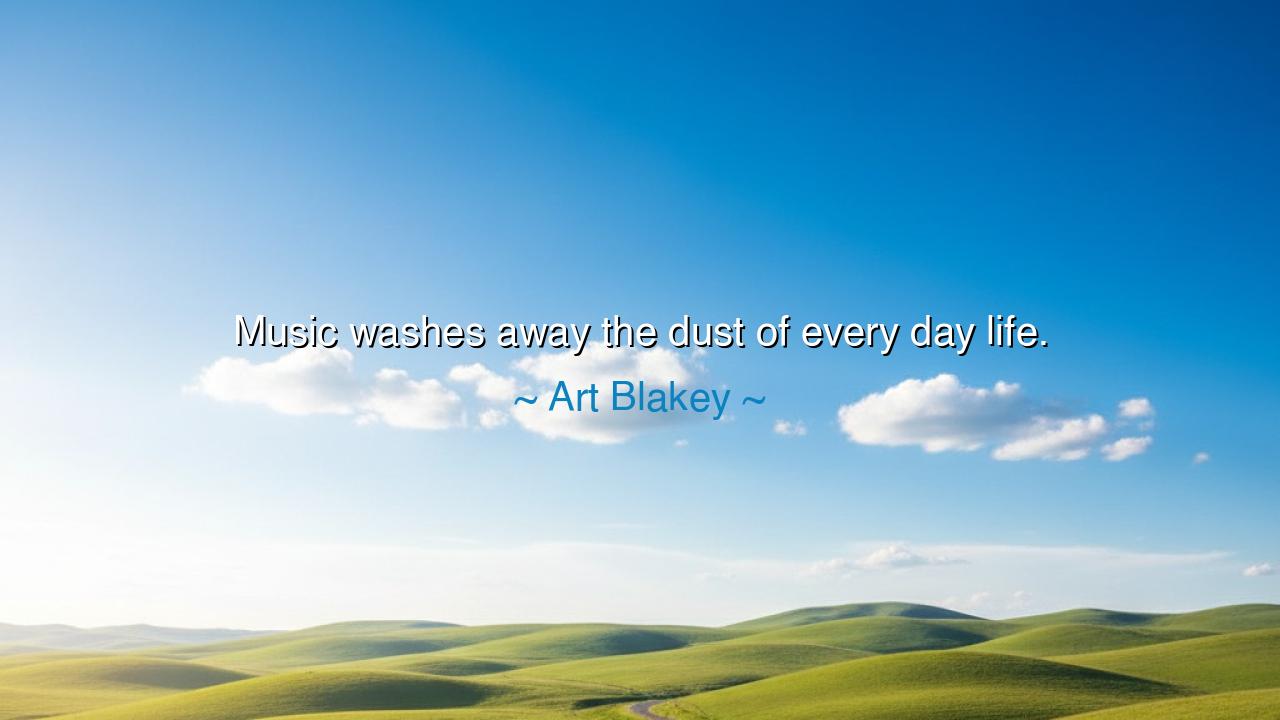
Music washes away the dust of every day life.






Hear the words of Art Blakey, master of rhythm and guardian of jazz’s fiery soul, who declared: “Music washes away the dust of everyday life.” These words are not mere poetry, but a revelation of the spirit’s deepest need. For life, in its endless cycles of labor and toil, casts upon us a heavy dust—the weariness of routine, the burdens of sorrow, the weight of unspoken cares. And yet, Blakey tells us, there is a cleansing power in music, a fountain that refreshes the weary heart, washing away the stains of struggle and renewing the soul with vitality.
The dust of everyday life is not only the fatigue of the body, but the dulling of the spirit. It is the accumulation of worries, the erosion of wonder, the numbing of joy. Every man and woman knows this dust, for it gathers unseen upon the heart with each passing day. But Blakey, who gave his life to the thunder of drums and the song of improvisation, knew that music is water for the soul. When the rhythm rises, when the melody flows, when harmony pierces silence, the dust falls away, and the spirit stands clean, alive once more.
Consider the story of those who endured the darkest of days—soldiers in the trenches of war, oppressed people in bondage, workers bent beneath unyielding labor. Again and again, they turned to music for strength. The African American spirituals, sung by the enslaved, were not mere songs but rivers of hope, washing away despair, carrying faith into another day. In the First World War, weary soldiers sang to keep their courage alive, letting the rhythm banish the dust of terror. In each case, music did what words alone could not—it cleansed, it healed, it renewed.
Even the great composers testify to this power. Beethoven, though deaf, poured his heart into his symphonies, and in so doing, he cleansed his own suffering. His music did not deny his pain, but it transformed it, lifting both himself and the world into grandeur. To hear his works is to feel the dust of ordinary life swept away, replaced by the fire of the eternal. This is the mystery Blakey speaks of: music is not escape, but renewal. It does not erase life—it purifies it.
The meaning, then, is heroic: do not allow the dust of life to harden upon your soul. Seek out music, let it flow through you, let it remind you of beauty beyond burdens, harmony beyond chaos. In music, we glimpse the eternal order, the heartbeat of the universe itself, reminding us that we are more than workers, more than weary bodies—we are beings of spirit, meant to dance, to sing, to rejoice.
The lesson is clear: do not neglect music. In times of sorrow, let it comfort you. In times of joy, let it magnify your gladness. In the ordinary days, when life feels heavy with monotony, let it cleanse your spirit. Make room for song in your household, rhythm in your steps, melody in your silence. For when you do, the dust will not bury you, but be washed away, and your soul will shine anew.
Practical steps are simple yet profound. Listen daily to music that uplifts your heart. Sing even if your voice trembles; play even if your skill is small. Share songs with others, for the cleansing of music is multiplied in community. And above all, approach music not as background noise, but as sacred water for the spirit. Let it renew you, restore you, and reconnect you to the joy that lies beyond the dust.
Thus, the wisdom of Art Blakey endures: music is the great cleanser, the eternal spring that washes away the dust of everyday life. Drink deeply from it, and you shall walk lighter, see clearer, and live with a spirit refreshed, ready to face the trials of each new day.






AAdministratorAdministrator
Welcome, honored guests. Please leave a comment, we will respond soon